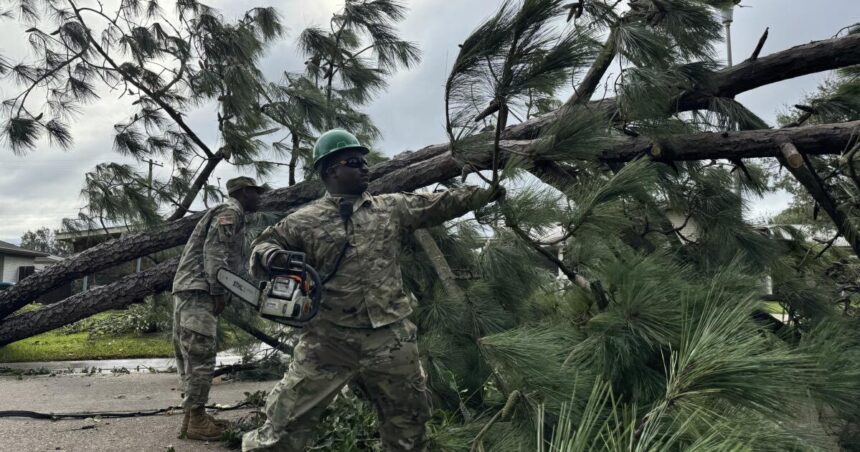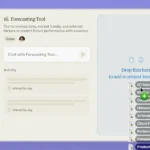Francine weakened on Thursday, knocking out power to hundreds of thousands of homes and businesses, bringing storm surge to coastal areas and spreading heavy rains along the northern Gulf Coast, raising fears of flooding in New Orleans and surrounding areas.
New Orleans awoke to widespread power outages and streets covered in debris. Just before sunrise, street lights remained on for a few blocks, but power remained out across large swaths of the city. The roar of home generators could be heard outside some homes.
Forecasters warned that parts of Mississippi, Arkansas, Tennessee, Alabama, Georgia and southern Florida could get 3 to 6 inches of rain, with up to 10 inches expected in parts of Alabama and Florida, causing widespread flash flooding including Jackson, Mississippi; Birmingham, Alabama; Memphis, Tennessee; and Atlanta.
The hurricane struck Terrebonne Parish along the Louisiana coast on Wednesday evening with winds of up to 100 mph, hitting an area vulnerable to a string of devastating hurricanes in 2020 and 2021. It then moved quickly toward New Orleans, pounding the city with torrential rains.
In New Orleans, rapids nearly engulfed a pickup truck parked in an underpass, trapping the driver inside. A nearby man grabbed a hammer and waded into waist-high water, smashing a window and pulling the driver out, as a WDSU-TV news crew captured on camera live Wednesday night.
“We just had to go out there and do it,” Myles Crawford said after leading the man to shore.
“I’m a nurse, I have to save lives, right?” Crawford, an emergency room nurse at University Medical Center, said moments after the rescue, later in an interview outside her home, her hand wrapped in a large bandage from a cut sustained during the rescue.
“I’m used to high-stress, high-level stuff on a daily basis,” he said. “We deal with that stuff all the time, so this was nothing out of the ordinary.”
There were no immediate reports of deaths or injuries. Television news from coastal areas showed waves from nearby lakes, rivers and the Gulf of Mexico slamming against seawalls. Water flowed into streets during torrential rains. Oak and cypress trees were toppled by strong winds and several utility poles shook.
Jefferson Parish President Cynthia Lee Shen said in a social media post that water had subsided early Thursday in Jefferson Parish, where roads were flooded but canals were still high. She said pumps had been used to remove water overnight, but problems with the sewer system meant it couldn’t keep up with the storm.
Mori said there were no major injuries or fatalities.
“Let’s continue this effort,” she said, noting that the dangers after a storm can sometimes be more dangerous than the storm itself, and asked residents to allow the parish time to clear roads.
As the sun rose Thursday in Morgan City, about 30 miles from where the storm’s center made landfall, Jeffrey Beadle, 67, emerged from the hotel room where he had taken shelter overnight as streets flooded and gusty winds pounded the town.
Beadle left her home in low-lying Bayou Lewis, about 10 miles outside of town, leaving almost all of her belongings behind Wednesday afternoon as the rain began to get heavier. She had lived there for 30 years without any major damage, but with her home located squarely in the hurricane’s path, she feared this time would be different. She loaded her car and was preparing to return to check on her home.
“There’s no one I can call over there,” he said. “I don’t know what to do. I hope everything works out.”
According to the National Hurricane Center, the storm weakened from a tropical storm to a tropical depression on Thursday, with maximum sustained winds of 35 mph, and was swirling north-northeast over Mississippi at nearly 12 mph. Francine continued to weaken and become a subtropical depression later that day, before turning north the next day and slowing as it passed over central and northern Mississippi through early Friday.
More than 390,000 outages were reported in Louisiana early Thursday, while 46,000 outages were reported in Mississippi, according to tracking site poweroutage.us.
Lafourche Parish sheriff’s deputies helped evacuate 26 people, including many young children, trapped by rising waters in a home in Thibodaux on Wednesday evening, transporting most of them to emergency shelters, Sheriff Craig Webre said in a news release. Deputies also rescued residents from rising waters in other parts of Thibodaux and in the Kramer area.
Francine, the sixth named storm in the United States, drew strength from the and strengthened to a Category 2 storm before making landfall. It weakened to a tropical depression late Wednesday.
In addition to torrential rains, the storm’s offshoot tornado threat continues in Florida and Alabama on Thursday.
Louisiana Gov. Jeff Landry said the National Guard would be deployed to parishes affected by Francine. The Guard has food, water and about 400 high-water vehicles, about 100 boats and 50 helicopters to respond to the storm, including possible search and rescue efforts.
According to the Weather Channel, about 57 hurricanes have passed through or made landfall in Louisiana since the mid-19th century, including some of the most powerful, costliest and deadliest storms in U.S. history.
Brooks and Klein are Associated Press writers. Klein reported from Baton Rouge, Louisiana. Associated Press writers Kevin McGill in New Orleans, Carr Anderson in St. Petersburg, Florida, and Russ Bynum in Savannah, Georgia, contributed to this report.









